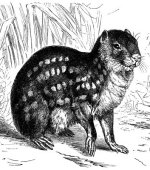 The Paca (Agouti paca) is a solitary, nocturnal animal which can be found from Mexico to Paraguay. It lives in the rainforests near water and can dig burrows that can be two meters in length, with usually one exit, and Pacas have usually more than one burrow. To escape danger, Pacas usually flee to the water, they are good swimmers. Pacas have three to five spots on the sides of their bodies and can weigh between 6 and 12 kilos. They use their urine and anal glands to mark their territories. The Paca is considered a pest by the formers as they eat their food crops like yams, cassavas, sugar canes and corns. While they are not endangered, their numbers decline due to habitat destruction and hunting.
The Paca (Agouti paca) is a solitary, nocturnal animal which can be found from Mexico to Paraguay. It lives in the rainforests near water and can dig burrows that can be two meters in length, with usually one exit, and Pacas have usually more than one burrow. To escape danger, Pacas usually flee to the water, they are good swimmers. Pacas have three to five spots on the sides of their bodies and can weigh between 6 and 12 kilos. They use their urine and anal glands to mark their territories. The Paca is considered a pest by the formers as they eat their food crops like yams, cassavas, sugar canes and corns. While they are not endangered, their numbers decline due to habitat destruction and hunting.
The Spotted paca is listed as Least Concern (LR/lc), lowest risk. Does not qualify for a more at risk category. Widespread and abundant taxa are included in this category, on the IUCN Red List of Threatened Species
Countries
Argentina, Belize, Bolivia, Brazil, Colombia, Costa Rica, El Salvador, French Guiana, Guatemala, Guyana, Honduras, Mexico, Nicaragua, Panama, Paraguay, Suriname, Trinidad and Tobago and VenezuelaSome facts about the
Paca
Adult weight : 9 kg (19.8 lbs)
Maximum longevity : 16 years
Female maturity :365 days
Male maturity : 365 days
Gestation : 116 days
Weaning : 78 days
Litter size : 1
Litters per year : 2
Interval between litters : 191 days
Weight at birth : 0.68 kg (1.496 lbs)
Basal metabolic rate : 15 W
Body mass : 9.156 kg (20.1432 lbs)
Temperature : 36.85 °C (98.33 °F)

Custom Search